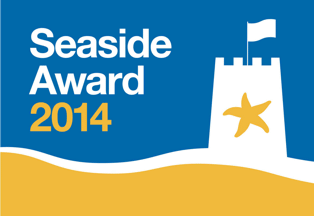From a R.N.L.I. brochure.
André Coutanche, 9 July 2005
Danger flag
![[Danger flag]](../images/g/gb_dange.gif) by Marcus Schmöger, 24 September 2001
by Marcus Schmöger, 24 September 2001

Last modified: 2014-12-13 by rob raeside
Keywords: bathing flags |
Links: FOTW homepage |
search |
disclaimer and copyright |
write us |
mirrors
See also:
![[Bathing flag]](../images/g/gb_bathi.gif) by Marcus Schmöger, 24 September 2001
by Marcus Schmöger, 24 September 2001
Red and yellow flags mark areas of water that are patrolled by lifeguards.
These are the safest places to swim.
From a R.N.L.I. brochure.
André Coutanche, 9 July 2005
Spotted at Tynemouth, County Tyne and Wear, were specific signal flags at the beach. The one flying was red over yellow. On a signpost there was an explanation of different signal flags. The red over yellow flags indicates the bathing area. The surfing flag is checkered black and white, indicating the area for surfers. The danger flag is plain red and indicates that you should not enter the water, there.
Marcus E.V. Schmöger 24 September 2001
![[Surfing flag]](../images/g/gb_surf.gif) by Marcus Schmöger, 24 September 2001
by Marcus Schmöger, 24 September 2001
When you see the black and white chequered flags, it means an area of water has
been marked for use by craft. For your own safety do not swim in these zones.
From a R.N.L.I. brochure.
André Coutanche, 9 July 2005Danger flag
![[Danger flag]](../images/g/gb_dange.gif) by Marcus Schmöger, 24 September 2001
by Marcus Schmöger, 24 September 2001
The red flag indicates danger. Never enter water when the red flag is flying.
From a R.N.L.I. brochure.
André Coutanche, 9 July 2005
![[Offshore wind flag]](../images/g/gb@hosw!.gif) image by António Martins-Tuválkin, 7 July 2007
image by António Martins-Tuválkin, 7 July 2007
At http://www.e-lindsey.gov.uk/leisure/tourism/beach-safety/beach-flags.cfm is a yellow flag bearing a traffic danger sign in black i.e. an exclamation mark inside a triangle.
Explanation given (quote): “HAZARD - OFF SHORE WINDS. This flag indicates
that wind conditions are especially dangerous - so under no circumstances
should you take an inflatable into the sea.”
The same flag is shown on a table, see photo end of webpage.
Jan Mertens, 27 January 2007
![[Offshore wind flag]](../images/g/gb@hosw2.gif) image by António Martins-Tuválkin, 7 July 2007
image by António Martins-Tuválkin, 7 July 2007
At
http://www.norfolk-norwich.com/norfolk/discovering-norfolk/beach-guides.php
is a notation about "OFFSHORE WINDS / An orange wind-sock flag - beware of
offshore winds." An orange pennant is shown. As to a windsock (a drawing,
really), see
http://www.go-cornwall.com/BeachesSafety.html, with caption: "NO INFLATABLES
/ (when blowing offshore)". I wonder which is the official one - the yellow flag
with the triangle & exclamation mark, the orange pennant, or the orange
windsock?
Jan Mertens, 28 January 2007
I am not sure in this case that it is possible to say for sure what might be
an "official" flag, as there is no competent authority covering the whole of the
United Kingdom, or even England, in this instance. My personal observations
since 1974 would indicate that there is no official warning flag, as such, that
these matters are usually taken care of by the district council or other
appropriate local authority in the area concerned and that practice varies from
one area to another.
Colin Dobson, 30 January 2007
![[First aid flag]](../images/g/gb@fap.gif) image by António Martins-Tuválkin, 10 September 2010
image by António Martins-Tuválkin, 10 September 2010
According to this page, a green flag with a white couped cross is also used:
http://www.teignbridge.gov.uk/index.aspx?articleid=3508&mode=0. Last
flag, captioned: “White Cross on Green Flag - First Aid Point”. White crosses on
green background indicating first
aid seem to be widespread. But the above is (presented as) a
beach flag.
Jan Mertens, 21 January 2010
![[Beach Signaling flag]](../images/g/gb@sfcom.gif) image located by Jan Mertens, 21 April 2011
image located by Jan Mertens, 21 April 2011
An orange-and-blue flag is used by beach
lifeguards for signaling in New Zealand.
Although British webpages do mention such a flag, consisting of a blue stripe on
an orange ground, this particular page shows the reverse:
http://www.slsawales.org/7043.html. “Used by lifeguards to
communicate the following messages where radios are not available.”
Jan Mertens,
21 April 2011
 image by Rob Raeside, 03 November 2014
image by Rob Raeside, 03 November 2014
Seen in Blackpool. The Seaside Award program is described at
http://www.keepbritaintidy.org/seasideaward/561 - this award appears to be
international, like the blue flag awards.
See
also: Seaside Award flag
Rob Raeside, 03 November 2014